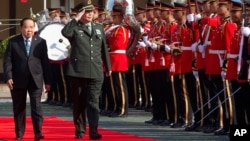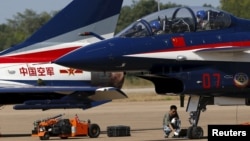Recent military agreements between Thailand and China are sparking speculation about the depth of their defense cooperation.
Chinese Defense Minister and State Councilor General Chang Wanquan and his Thai counterpart, Prawit Wongsuwan, held talks this week on the sidelines of the ASEAN Defense Ministers meeting in Laos.
Analysts say the meeting confirms that recent agreements are designed to strengthen cooperation; but they caution Thailand is unlikely to become overly dependent on Beijing for its military needs.
The agreements, negotiated between Thailand’s National Security Council and China’s intelligence agencies, covered strengthening military contacts, education, technology and development as well as bolstering joint efforts of the Expert Working Group for Counterterrorism.
Panitan Wattanayagorn, a political scientist and adviser to General Prawit, said the talks highlighted Thailand’s broadening of cooperation with major powers.
“The meeting reconfirmed and set clear activities based on those agreements in the last few months. It suggested that Thailand’s cooperation with major powers has been updated and have been brought to the new era,” Panitan said.
“This is significant as Thailand is increasingly enjoying more areas and more activities with major countries, including of course the United States, Japan, India, Russia and of course China in this case,” he said.
US policy sparks shifts
The Thai military, since taking power in 2014, initially turned to China as an alternate source to meet military and security needs after its traditional ally, the United States, reduced military cooperation following the May coup. Prawit, who is also deputy prime minister, has had several rounds of talks with China’s senior military figures in the past two years.
Analysts, however, say Thailand has also reached out to Russia and Europe to strengthen security ties. Prime Minister Prayut Chan-o-cha has held top level talks with both China and Russia to strengthen security ties and arms purchases.
Thailand’s navy is looking to purchase three Chinese-made S26 T Yuan Class submarines, while the Thai army purchased 28 VT4 battle tanks, also from China, with an option to buy a further 153 vehicles.
The Thai army, meanwhile, is looking to buy 12 Russian-made MI-17 helicopters instead of the traditional U.S.-made Black Hawks, which the Thai Army says are "too expensive."
Carl Thayer, a defense analyst with Australia’s University of New South Wales, said the Thai shift to procure weapons from China and Russia, together with European suppliers, is a direct outcome of the U.S. policy to halt sales to Thailand after the coup.
“Thailand with its needs to upgrade, it’s found it with Russia; sounding on with China has always been a part of the game that Thailand has played,” Thayer said.
“[Russia] wants its agricultural produce to get to the Thai market and this is a consequence, and I’m making no judgement of American policy to read negatively and perhaps heavy handedly when a country undemocratically changes its political system and that country is then left isolated,” he said.
The Thai military’s budget in 2016 is around $5.8 billion, accounting for almost 8 percent of total budget spending, with the current amount marking a 7 percent increase from last year.
Other sectors involved
Somphob Manarangsan, a political scientist and specialist on Thai-China relations, said despite the agreements, bilateral relations between the two countries have cooled in the past year.
Somphob said a breakdown in talks between Thailand and China over a $15.7 billion, 845-kilometer high speed rail line marked a step back in ties.
The Thai government announced the cancellation of the project in March. Analysts say the talks’ failure centered on investment sharing, total cost, as well as interest on concessionary loans.
Somphob said Thailand is looking to broaden its security and economic ties. “They could not put through that railway linkage project between China and Thailand. And currently Thailand is trying to liberate itself to come closer to Japan and some other countries and not only with China,” he said.
“I sense that Thailand is trying to have military ties with several countries, like with Russia, with USA and also with China. With the USA, we still have the Cobra Gold [joint military] exercise every year,” he said.
Somphob says Thailand is unlikely to become more militarily dependent on China. The Thai people prefer to be, he said, “well balanced among the superpowers.”
“That’s very important for Thailand, economically, politically or for security, particularly for the security,” he said.





